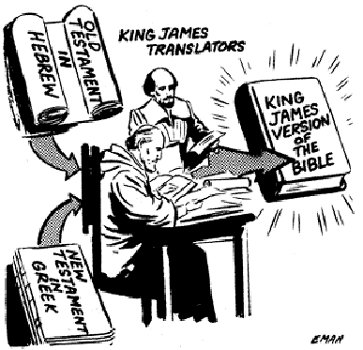
James & Tess Arendt

What does "King James Version" mean? (Class attendee: That the translation was made under the authority of King James.) Right! King James was living in the 16th and 17th centuries, the same time as Shakespeare. About that time the Protestants had pretty well won the victory in England and taken over from the Catholics. England had declared its independence from the Catholic Church and had formed the Church of England with the monarch at its head. Until then the people had not had very much in the way of a Bible in their common language. The Bible used by the Catholics at that time was the Latin Vulgate, which literally means vulgar Latin, the Latin of the common people. But by that time, the common people of England, the Anglo-Saxons and Normans and whatnot didn't speak Latin.
Originally in the early days of the Catholic Church, the Latin Vulgate was in the common language of the common people, believe it or not. But as the Roman Empire spread into many other countries with many other languages, instead of translating into those other languages they just kept on having their rituals in the Latin and reading the Bible in Latin, and everything was still done in Latin so that the people in the foreign countries outside of Italy didn't know what was going on. Everything was in Latin whether the people understood or not, and most people didn't. But since the Protestants now had broken away from the Catholic Church, they decided they needed a Bible of their own, in this case in England. There had been several attempted Protestant translations in English. Wycliffe's was the first English Bible, then in the 1500's Tyndale translated a Bible into the common language of the people from the original Greek and Hebrew. John Huss had tried to translate a Bible for the Presbyterians of Scotland, who were a Reformation group, and Martin Luther had already translated a Bible in German, as I recall, in the mid-1500's, for the common people of Germany.
There were several [English] versions in existence, none of them perfect, of course, and a good many of them incomplete as they usually had been done by individual men. So I'm sure it was of the Lord that dear King James was approached by the leaders of the English church, who decided that they needed a standard authorised version to use in all of their churches. Instead of this bunch over here using one version, and this bunch over there another translation, they were going to standardise the English Bible for use throughout the English churches.
So they persuaded King James to authorise a commission of 47 men, outstanding scholars who were really great literary men who knew Greek, Latin and Hebrew fluently, and they decided that a good new translation was needed in English. So they got together this whole group of Biblical scholars.--Hebrew scholars, Greek scholars, Latin scholars, men who really knew what they were doing--and they worked on this new English translation of the Bible for a good many years.
In the front of your Bible is the dedication written by these men, the translators who dedicated it to King James because he authorised it. And of course he had to foot the bill, too, because somebody had to pay for their room and board while they were working and translating. So it was paid for partly by the church and partly by the government, but the church was the government in those days.
They worked on it for five or six years, I've forgotten just how long, until they felt they had it just right, and they went over it and over it. The Hebrew scholars went over the Hebrew of the Old Testament, and the Greek scholars went over the Greek of the New Testament and the translation, and they even compared it with the Latin Vulgate. On your title page it even says, "The Holy Bible containing the Old and New Testaments, translated out of the original tongues: And with the former translations diligently compared and revised."
They not only translated it directly out of the original Greek and Hebrew, but they also compared it with other translations like Tyndale's and Wycliffe's and the Vulgate and Huss' and all these different translations which were in existence. They got all the help they could from as many sources as possible, feeling that they had gotten a Bible which was really a good translation, truly authentic and accurate. And when they finally did, they agreed on it and then they presented it to King James for his final approval and to be authorised by the king.
That's why they call it the Authorised Version, it was authorised by the King to be used throughout the English churches, or what is now known as the Church of England (or Anglican Church), and in other countries called the Episcopal Church. That was the only English Protestant Church, there were no other English denominations at that time. It was throughout all English-speaking churches, England, Scotland, Wales, etc.
Then of course when the church later began to have splits and divisions, they carried the same Bible with them and they used the same Bible just the same. They didn't develop any new translations, and it wasn't necessary because the King James was a good translation. It was accurate, authentic, and it had been agreed upon by a whole slew of excellent scholars and theologians who really knew what they were doing. So I believe the Lord really inspired not only the original, but I'm convinced that the Lord inspired the translators, because it's an excellent translation.
King James actually had little or nothing to do with the writing, but a few controversial points were brought up to him and he made a decision on them, along with the Archbishop of Canterbury, such as what to call the church. The translators wanted to use the word "assembly" or "congregation" each time it talks about the church--"the congregation of believers" or "the assembly of believers," which is what the word really meant, "the called-out ones." But the Archbishop of Canterbury told the king: "If you allow them to put in that kind of an interpretation, that will almost totally destroy my authority as the head of the organised religious organisation, and the authority of the church and its buildings. If you give them the impression that they don't have to have buildings or an organisation, that the church is just a group of believers, any believers, that's going to destroy the authority of the organised English Episcopal Church, and with that, it may destroy you!" So King James agreed with the Archbishop that they would continue to call it the English word "church," which literally came from an old English word "kirk," which meant a chapel, a building, and that is one of the few bad things about the King James Version.
But of course we know what the word "church" means and what it really is. The word that they were translating was "ekklesia." Ekklesia is a Greek word from the Greek New Testament meaning what? (Class attendee: The called-out ones!) The word literally means "called out," and when it's used as a noun it means "the called out," those who are called out. And so it means not a building, but what? (Class attendee: A group of people.)--Right!
The Latin Vulgate was to the Catholics what the King James is to the Protestants, it was a Bible finally put into the language of the people. The common language of the people in those early Catholic and Roman days was Latin, but it was "vulgar," as they call it, meaning a common type of Latin, and so they called it the Latin Vulgate. It was the principal translation of the Bible right up until very recent times, in fact, up until the time of the Reformation in the 1500s. For a thousand years at least, it was the translation read by the common people. And it's a good translation, not bad at all, and you can preach the Gospel out of a Latin Vulgate.
But in competition with the King James Version for the English and other common Bibles that were coming out during the Reformation, the Catholics decided they needed a new Catholic edition, an English translation of the Vulgate for the English Catholics. And so do you know what that translation was and is still in use today? It's called the Douay. It was an English translation by French scholars, and it's very good and still used by Catholics to this very day. The Douay Version is a good translation if you don't read the footnotes, which are all interpretative.
Since then, in modern times, the Paulist Fathers have translated an excellent, new, modern language translation known as the Confraternity. They are a very good association of brothers and priests who really seem to know the Lord. They are missionaries and evangelists who particularly specialise in trying to convert Protestants to Catholicism, and for that reason they have translated an excellent new modern language translation of the Bible, one of the best. I would say it's even superior to some of the other modern language translations in English. It's known as the Confraternity, "Confraternity of Christian Doctrine," if you want the long name. Confraternity simply means "the brothers together." The Paulist Fathers got together and translated this Bible, and it's in modern English, very good, and it really preaches the Gospel, even in the footnotes. They shy away from all those controversial Catholic doctrines, and they're really excellent in Revelation, Daniel and Bible Prophecy. The Confraternity Version is now an authorised English version of the Catholic Church and has been authorised by the Pope, etc. So if you want to witness to a Catholic from a modern translation that is easily understandable by them and has good footnotes, you can use that!
Later on the first major new English translation came out, published in 1881, called the English Revised Version. The American Standard Version was published in 1901, and then a Revised Standard Version in 1946. The American Revised Version was a very modernistic, unbelieving product of the high criticism of the Bible, written by guys who were not even Christians, not even believers. My father had a copy and always went to compare it to the King James to show how bad it was. They didn't call Mary a virgin, and had all kinds of things that belittled and minimised the miraculousness and the supernatural things of the Bible. These revisions are used by the modernists and unbelievers of America and England, written undoubtedly to try to subtly undermine faith in God and the Bible, it's pitiful!
Finally, the King James New Testament, alone of all the English translations, is based on the Greek text known as the Textus Receptus, which is the Greek New Testament used during the spiritual awakenings of the Reformation period. Before the invention of printing, of course, the Scriptures were transmitted by hand copying and circulation. The generally acknowledged and accepted manuscripts were, of course, widely used and so wore out fairly quickly and had to be continuously recopied on fresh papers or parchments.
Great numbers were always current, however, and there was thus a continual self-checking process going on, securing the text against any significant accumulation of copyists' errors. It was from this source that the Greek New Testament known as the Textus Receptus ("Received Text") was compiled. The great majority of the surviving manuscripts agree with this so-called "Byzantine" text, as preserved through the early centuries of Christianity by the Greek-speaking churches themselves.
When a manuscript was prepared which, either through carelessness or deliberate intent, contained significant errors or alterations, it naturally would tend to be discarded when its character was discovered. Unless it was deliberately discarded, however, it would tend to survive longer than others, for the very reason that it was not being used. This is probably the case with the so-called Sinaitic and Vatican manuscripts, as well as certain others, which were discovered in the 19th Century and which were older than any of the still-preserved manuscripts of the Received Text.
These manuscripts contain an amazing number of obvious and careless mistakes and probably even some deliberate alterations. Nevertheless, because of their antiquity, they were accepted by the scholars Westcott, Hort, Nestle and others as the basis for their Greek New Testaments, which were published in the 19th Century and which have in turn served as the basis for all the subsequent modern English translations.
Thus there is good reason to believe that the King James Version is still the most accurate and reliable translation we have. In view of the other considerations noted above, there is certainly as yet no good reason to replace it with some ephemeral modern translation.
Also see some specific errors in modern translations.

My name is James Arendt. I was raised in the Hegewisch neighborhood of Chicago, Illinois, served in the USAF from 1970 to 1974, and became a full-time missionary for Christ living 40 years in Japan, 3.5 years in Russia, and a few months in other countries such as Finland, Poland, Estonia, Latvia, South Korea, Taiwan and mainland China where I also served the King of Kings, Jesus, as an Ambassador for His Kingdom. My full bio.
If you like this website, you can show your appreciation by sending me a gift toward my support. My wife Tess and I moved from the island of Guam USA in June 2023 to the city of Allen in the province of Northern Samar, one of the poorer provinces in the Philippines. My only work is maintaining my websites, Deep Truths, and James Japan which costs me $300 per year now. And Tess is ministering to the local people giving them regular Bible Studies in three groups, children, teenagers and adults.
You may like my James Japan site as well because it covers subjects that are not covered in Deep Truths such as things like the Climate Change Hoax and the COVID-19 death-jabs.
You don't need a PayPay account to send me a donation! Just click on the donate button and you will see an option to send through your debit or credit card.
 If you'd like more inspirational material,
If you'd like more inspirational material,